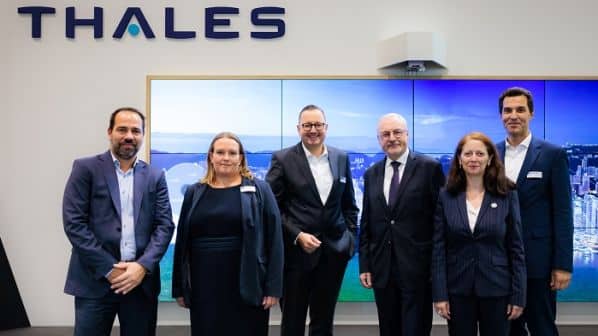THALES and Knorr-Bremse have signed a Memorandum of Understanding (MoU) to cooperate on developing freight automation as they work to increase the sector’s efficiency, competitiveness and flexibility in order to meet European targets on rail becoming the backbone of freight transport to achieve ambitious 2030 climate goals.
The two companies plan to develop automated digital features and functions by bringing together their expertise of ATO in order to help development of the fully-fledged digital freight train (DFT). Thales and Knorr-Bremse say that ATO can be of great assistance to drivers and so can help counter the rail freight sector’s looming staff shortage as well as improving efficiency, punctuality and competitiveness.
“Full autonomy is still a work in progress, although the necessary technologies are maturing rapidly,” says Thales Germany’s vice-president for main line signalling and managing director of ground transportation systems, Dr Yves Joannic. “ATO is one of them, as a necessary step towards achieving fully autonomous driving.”
The two partners point out that train punctuality and estimated time of arrival (ETA) targets depend on smooth, consistent driving as well as factors such as track characteristics, topography, other rail traffic and train-specific parameters such as size and weight of the load, all of which have an effect on traction and braking performance.
They say that while many of these parameters are still monitored manually, digital and automated systems can significantly improve how they are tracked and utilised. For example, by using sensor-based, real-time data the new smart features they are developing can deliver intelligent insights to drivers and help them to devise optimal driving strategies.
Earlier this year Knorr-Bremse announced the conclusion of a strategic cooperation and investment agreement with Nexxiot of Switzerland, which will see the company’s sensor technology deployed to improve the performance of Knorr-Bremse equipment.
In addition, Knorr-Bremse has recently been testing a prototype Digital Automatic Coupler (DAC) as part of a European drive to improve efficiency and speed of freight operations.
“In our industry, ATO is a key lever for making rail freight more efficient and more available, increasing transport capacity and further optimising lifecycle costs for operators,” says chairman of the management board of Knorr-Bremse Rail Vehicle Systems, Dr Nicholas Lange. “Our partnership agreement with Thales has enormous potential for bringing about the innovations required to enable safe and smooth ATO and thus improve, for example, energy efficiency and punctuality.”

